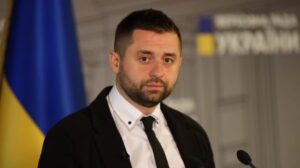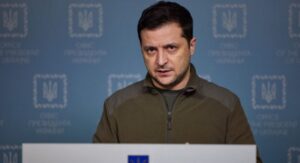
The vast majority (79.2%) of refugees from Ukraine intend to return to their homeland after the end of the war, and only 10.9% do not plan to return, according to the results of a survey conducted by the Sociological Service of the Razumkov Center at checkpoints in the Transcarpathian region from March 15 to April 1.
During the survey, 101 respondents over 16 years old were interviewed, who were traveling from Ukraine on foot or by road. 89.1% are sure that Ukraine will win this war, only 1% are sure that it will lose, the rest found it difficult to answer.
83.2% of refugees are women. 63.4% travel with their children and only 12.9% on their own.
36.6% – leaving the country at the age of 30-39, 25.7% – 40-49 years old, 18.8% – 16-29 years old, 10.9% – over 60 years old and 7.9% at the age of 50 -59 years old.
The relative majority of refugees are from Kyiv and Kharkov regions (18.8% each), slightly less from Kiev (11.9%), Donetsk (7.9%), Zaporozhye (6.9%), Mykolaiv, Odessa, Kherson ( by 5%) regions. No one left Volyn, Lvov, Khmelnytsky, Ivano-Frankivsk, Chernivtsi, Ternopil regions. 55.4% stated that they left the settlement where the hostilities took place, 12.9% – that the hostilities took place nearby, 9.9% – that there were no hostilities, but their locality was bombarded or shelled, 13.9 % – that this happened in a neighboring settlement, and only 7.9 noted that there were no hostilities and shooting either in their settlement or nearby.
26.7% reported that they received assistance from government agencies, 53.5% – from volunteers, 8.9% – from religious organizations, 6.9% – from enterprises (including at the place of work), 40, 6% – from relatives and friends, 44.6% – from unfamiliar fellow citizens, only 20.8% received no help at all. 63.4% of refugees said that the language of communication at home is Russian (only 30.7% – Ukrainian), but only 21.8% called Russian their native language (Ukrainian 65.3%, 4% named another language).

Ukrainian Foreign Minister Dmytro Kuleba had a conversation with Moroccan Foreign Minister Nasser Burita.
“Ukraine and Morocco maintain friendly bilateral relations, and we look forward to their further strengthening in all areas, including food security, trade expansion and cooperation within international organizations,” Kuleba wrote on Twitter.
As reported, President of Ukraine Volodymyr Zelensky on Thursday, March 31, signed a decree by which he recalled the Ukrainian ambassador to Morocco.
“There are those who work together with everyone for the defense of the state. In order for Ukraine to win back its future. We appreciate the work of each such person. And there are those who waste time just to remain in office. Today I signed a decree to recall such a person, to recall such an ambassador from Morocco,” the president said.

The Russian side at the talks with Ukraine agreed that the referendum is the only way out in the process of recognizing the country’s neutral status, David Arakhamia, head of the Ukrainian delegation at the talks, said during a telethon on Ukrainian television on Saturday.
“The Russian side agreed that this would be the only way out of this situation,” he said.
Answering the question what will happen if the transition to a neutral status is not supported by the people of Ukraine, Arakhamia said that “the treaty will then not have legal force, and we will either return to a state of war, perhaps, or return to new negotiations.”

President of Ukraine Volodymyr Zelensky has called the visit of head of the European Parliament Roberta Metsola to Ukraine against the background of the war a manifestation of heroism.
“I would like to sincerely thank you personally, Roberta, and all your team for the fact that at such an important moment for our country, when Ukrainians believe in deeds and concrete steps, you demonstrate heroism to come to Ukraine. And today it is heroism,” Zelensky said during his meeting with Metsola in Kyiv.
He also thanked the head of the European Parliament for the joint telephone talks held several times before the start of the Russian-Ukrainian war.
“The result of these conversations was your appeal to parliamentarians, the world community and some kind of support for Ukraine at the level of the European Parliament. And we highly appreciate these steps. Today we look through the prism of ‘friends and foes’, because we do not have time and there is no gray color for us in international diplomacy. Therefore, the issue of survival is acute. We are glad that you are on the side of light and kindness towards Ukraine,” he added.
Zelensky noted that he was unable to leave Kyiv and personally address the European Parliament, but expressed confidence that “nevertheless, today the voice of Ukraine is heard.”
“And I am glad that there is no status and pathos in our relationship. You have arrived, and this is a very important sign. We will never forget this,” he concluded.
By the decree of the President of Ukraine dated March 31, Roberta Metsola was awarded the Order of Princess Olga.

Prime Minister Denys Shmyhal says that Ukraine is waiting for proposals from partners on the country’s existing external debts. “Of course, we expect steps and some proposals from our partners on our country’s existing external debts… I think that in the near future we will find a format for how to ease the debt burden of our country. We have started this work, and I think there will be a result in the coming weeks,” Shmyhal said on the air of the national telethon on Friday afternoon. At the same time, the Prime Minister stressed that Ukraine is a responsible payer for its obligations.

Following regular talks with Turkish President Recep Tayyip Erdogan, President of Ukraine Volodymyr Zelensky announced the readiness of the Turkish state to become a guarantor of Ukraine’s security.
“Had another conversation with a real friend of Ukraine, President of Turkey Recep Erdogan. Noted the high level of organization of negotiations of delegations in Istanbul. Agreed on further steps towards peace. Thanked for the readiness of Turkey to become the guarantor of security of our state!” Zelensky tweeted.